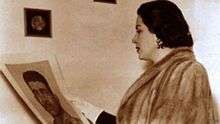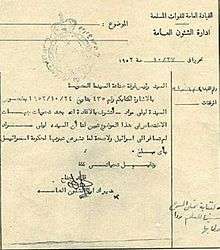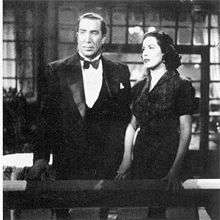Leila Mourad
Leila Murad (Arabic: ليلى مراد; February 17, 1918 – November 21, 1995) was an Egyptian singer and actress, and one of the most prominent superstars in the Arab world in her era. Born Lillian Zaki Mourad Mordechai to a Jewish family in the El Daher District in Cairo, she later changed her name to Leila Murad as a stage-name. Leila married three times
Leila Mourad ليليان زكي مراد موردخاي | |
|---|---|
 Layla Mourad in 1943. | |
| Background information | |
| Birth name | Lillian Zaki Mourad Mordechai |
| Born | February 17, 1918 Cairo, Egypt |
| Died | November 21, 1995 (aged 77) Cairo, Egypt |
| Genres | Egyptian music |
| Occupation(s) |
|
| Years active | 1934–1963 |
Life
Layla Murad was born on February 17, 1918 to Egyptian Jewish parents, Ibrahim Zaki Murad Mordechai and Gamilah Ibrahim Roushou, the daughter of Ibrahim Roushou, a local concert contractor in the early 20th century who regularly booked Zaki Mourad to sing at concerts and wedding parties.[1][2] [3] [4] Her father was a respected singer, musician, and religious Jewish cantor (Hazzan). One of her brothers, Mounir Mourad, was an actor and composer.
She made her first stage appearance, aged nine, at the Saalat Badi'a, one of Cairo's most successful Music Halls. The theatre had been founded in 1926 by the actress and dancer Badi'a Masabni, who became Mourad's patron.[5] Her first film appearance, aged fifteen, was in the 1932 " Al-Dahaaya " (The Victims) which had originally been made as a silent film. Her song, The Day of Departure, was added as part of the transformation of the production into a "talkie".[6]
She was trained by her father and Dawood Hosni, who was also Jewish. Hosni had composed the first operetta in the Arabic language, and he composed two songs for Leila: Hairana Leh Bein El-Eloub (Why can't you choose from among lovers), and Howa el dala'a ya'ani khessam (Does daliance mean avoiding me?). Further success came when the prominent Egyptian composer Mohammed Abdel Wahab heard her singing and gave her a role in his film Yahia el Hob (Viva Love!) in 1938. In the six years following the success of Yahia el Hob she made five best selling films with director Togo Mizrahi, becoming Egypt's top actress. In 1945 she made Layla Bint al-Fuqara ("Layla, daughter of the poor") directed by Anwar Wagdi whom she married shortly after. She went on to make a further 20 films of which the most outstanding is Ghazel el-Banat ("The Flirtation of Girls"), also directed and co-starring Wagdi. It also featured Nagib al-Rihani and Abdel Wahab in their last appearances on film.[7]


In 1953, she was selected, over Umm Kulthum, as the official singer of the Egyptian revolution(citation needed). Shortly thereafter, a rumor that Mourad had visited Israel, where she had family, and donated money to its military, raised suspicions of spying and caused some Arab radio stations to boycott her. She denied these allegations .[8] No proof was found that she had contributed money to Israel's military; the Egyptian government investigated and concluded that the charges against the singer were without foundation.
Her decision to retire, aged 38, came with the failure of her last film, Al Habib al Majhoul (The Unknown Lover), the banning of her song, With Unity, Order, and Work, praising the Free Officers 1952 revolution and the outbreak of the 1956 war.[9] Despite the immense popularity of her films her singing career was over-shadowed by Um Kulthum who dominated Egypt's musical landscape and, in 1949, had become president of the Musicians' Union. In the early 1950s other singers also popular with younger audiences, such as Abdel al Halim Hafez, did not get the same exposure on the radio as Um Kulthum.[10]
Leila Mourad's relationship with her family was not an easy one, possibly due to money . Between 1967 and 1970, hundreds of Egyptian Jewish males were deported to the prisons of Abu Zaabal and Tura, including Leila's brother, Isak Zaki. Families of the detainees were allowed to visit beginning in 1968, and some noted that Leila was never seen visiting her brother.
Leila Mourad made a few brief reappearances during Ramadan in 1970, when she was scheduled to read Salah Jaheen's "Fawazeer Ramadan" (Ramadan' puzzles), a daily traditional radio program held during the Holy month of Ramadan.
Leila Mourad died in a hospital in Cairo in 1995.
Marriages
Leila Mourad married Anwar Wagdi (1945–1953), over the objection of her father. They were married and divorced three times. Leila gives the reason for her divorces as the fact that she was not fully aware of the seriousness of Wagdi's illness, one that made him constantly irritable and difficult to live with. Later she married Waguih Abaza (1955–1956), and then film director Fatin Abdel Wahab 1957 and she gave birth to their son Zaki Fatin Abdel Wahab, and finally divorced in 1969.
Works

Her famous songs include:
- "Yama Arak el nasim"
- "Ya msafer we nassi hawak"
- "Albi dalleli"
- "leeh khaletni ahebak"
- "Elmaya we el hawa"
- "Ya aaz mn Ainy"
- "Sanaten wana ahayel feek"
- "Etmakhtary".
- "El Hob Gameel".
- "Monaya fi Korbak"
- "Abgad Hawaz".
- "Einy Betref", a duet with the Egyptian actor "Naguib AlRaihani".
- "Bil-Itihad wa al-Nizam wa al-Amal" (1953)
Her movies include:
- Sayedat al-Qitar (Lady on the Train), 1953.
- Ward el gharam (Flowers of Love), 1952.
- Ghazal Al Banat (Flirtation of Girls), 1949.
- El Hawa wal chabab (Love and Youth), 1948.
- Darbet el kadar (The Blow of Fate), 1947.
- Qalbi dalili (My Heart is My Guide), 1947.
- Khatem Suleiman (Solomon's Ring), 1947.
- Leila bint el agnia (Leila, Daughter of the Rich), 1947.
- Leila bint el fukara (Leila, Daughter of the Poor), 1946.
- El Madi el maghoul (The Forgotten Past), 1946.
- Shadia al wadi (The Singer in the Valley), 1946.
- Leila fil zalam (Leila in the Shadows), 1944.
- Leila, bint al-madaress (Leila, the Schoolgirl), 1942.
- Laila, ghadet el camelia (Leila, Lady of the Camelias), 1942.
- Shuhaddaa el gharam (Romeo and Juliet), 1942.
- Leila, bint el rif (Leila, the Girl from the Country), 1941.
- Laila momtera (Stormy Night), 1940.
- Yahya el hub (Long Live Love), 1938.
Legacy
The Ramadan television series " Ana Albi Dalili " (named after one of her songs), about the life of Leila Mourad, debuted in 2009. It is an Egyptian production headed by Syrian director Muhamad Zuhair Rajab. Safa Sultan, a Syrian actress, plays Leila Mourad. Egypt's Ahmed Falakus portrays Anwar Wagdi. Ezzat Abou Aouf, an Egyptian actor, portrays Zaki Mourad and Egyptian actress Hala Fakher portrays Miriam, the aunt of Leila Mourad.[11]
References
- "منير مراد.. التهميش والطائفة والترفيه". جريدة الرياض (in Arabic). Retrieved June 25, 2020.
- Zaki, Tawfiq Abdel Hamid (1993). "Family Musical Groups.
(AR: أسر موسيقية)". The contemporary pioneers of the arabic music (AR: المعاصرون من رواد الموسيقى العربية). Egypt - The Middle East.: The General Egyptian Book Organization. pp. 83–86. line feed character in
|chapter=at position 23 (help); line feed character in|title=at position 46 (help) - Laila Murad the daughter of the famous Egyptian Jewish composer Zaki Mourad
- "ET commemorates birth anniversary of legendary Leila Mourad".
Mourad was born to Ibrahim Zaki Mourad Mordechai and Gamilah Salmon. Her father, an Egyptian Jew, was a respected singer, musician, and religious Jewish cantor, Hazzan. Her mother was a Jewish Egyptian of Polish origins.
- Danielson, Virginia (1977) The Voice of Egypt. Umm Kulthum, Arabic song, and Egyptian society in the twentieth century. AUC Press, Cairo. ISBN 977 424 386 2. pp.48,67
- Darwish, Mustafa (1998) Dream Makers on the Nile. A Portrait of Egyptian Cinema. AUC Press, Cairo. ISBN 977 424 429X. p.24
- Darwish. pp.24,25
- Beinin, Joel (1998). The Dispersion of Egyptian Jewry. University of California Press. 1st edition. p. 84.
- Darwish. p.24
- Danielson. p.120
- Bizawe, Eyal Sagui. "The return of Cinderella." Haaretz. October 1, 2009. Retrieved April 10, 2013.